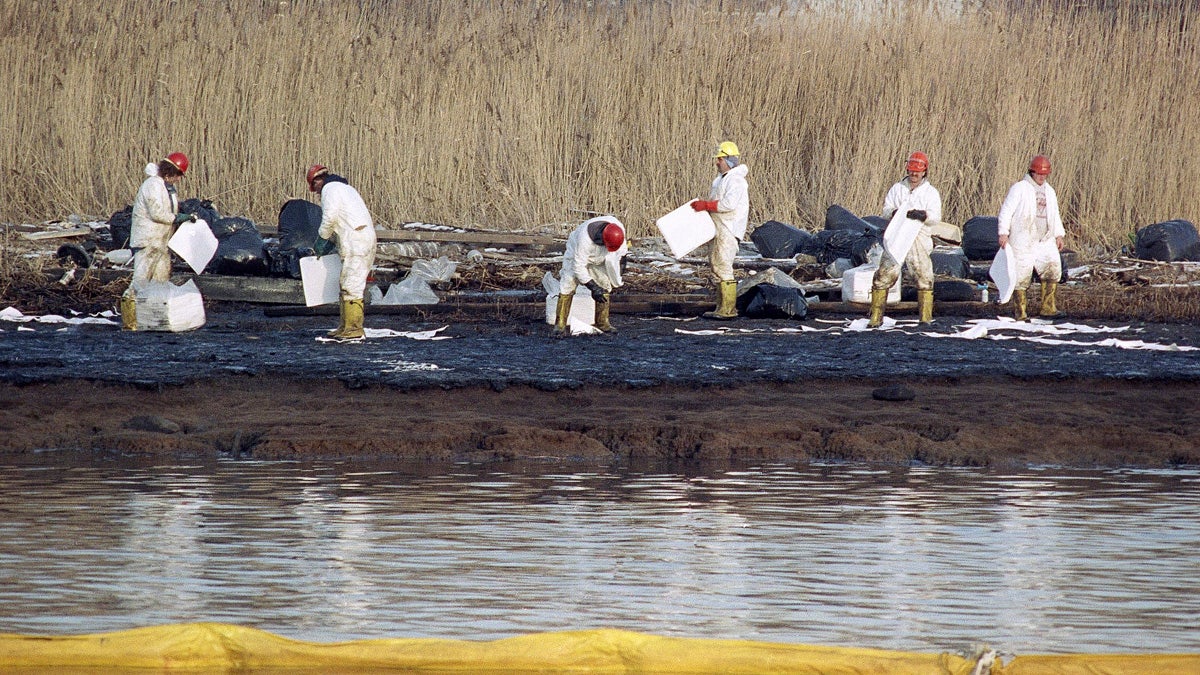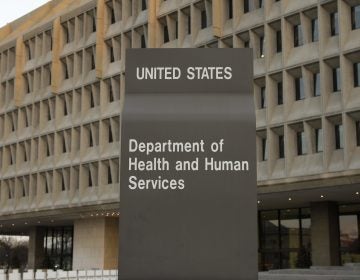Where are N.J.’s new chemical rules? Environmentalists accuse DEP of more foot-dragging on PFAS
The DEP denies tomorrow’s stakeholder meeting will mean further delay in setting health limits on two toxic chemicals.

Cleanup workers lay down absorbent sheets to clean bird sanctuary Pralls Island between Linden, New Jersey and Staten Island, New York (AP file photo)
Environmentalists are urging state officials to speed up regulation of two toxic chemicals that have been recommended for tight new health limits by state scientists but subjected to unexplained delays of up to nearly two years by the Department of Environmental Protection.
The chemicals, PFOA and PFOS, are part of the PFAS family that has come in for increasing regulation by New Jersey and some other states as more is learned about their links to cancer and other illnesses.
The chemicals have been found in New Jersey more often and in higher concentrations than in many other states. EPA tests from 2013-2015 found PFOS in 3.4 percent of New Jersey public water systems, almost twice the national rate of 1.9 percent.
Scientists at the Drinking Water Quality Institute, which advises the DEP, recommended Maximum Contaminant Limits (MCLs) for PFOA in March 2017 and PFOS in June 2018 after exhaustive research into both chemicals. But the DEP has not yet begun the process that would eventually adopt those standards, baffling campaigners who say the public remains exposed to the chemicals because of the DEP’s inaction.
“Inexplicably, DEP has not issued rulemaking to establishing the MCLs for PFOA and PFOS despite all the scientific and public health analysis being completed and delivered to DEP by the DWQI,” said the environmental group Delaware Riverkeeper Network, in a letter to Gov. Phil Murphy on January 7. “This means people continue to drink contaminated water.”
Officials say they understand need for quick action
Although New Jersey became the first state to adopt an MCL for any PFAS chemical when it implemented a new health standard for PFNA, another PFAS chemical, in August 2018, progress now appears to have stalled, DRN said.
“Each day that passes in which another New Jerseyan is exposed to the risk of harm from PFOA and PFOS represents the concomitant failure of the state to properly and prudently regulate these toxic compounds,” said DRN, which has campaigned for years for strict state limits on the chemicals.
In a joint statement, the Governor’s Office and the DEP said they understand the need for quick action but did not specify when officials might propose a limit for either of the chemicals in line with the DWQI’s recommendations.
“The DEP shares the public’s urgency to establish new limits on perfluorooctanoic acid (PFOA) and perfluorooctane sulfonate (PFOS) in New Jersey’s drinking water. Establishing these limits, known as maximum contaminant levels (MCLs), not only serves to better protect New Jerseyans, it also sets an example for the rest of the nation to follow,” the statement said.
The environmentalists’ concerns come just before the DEP holds a stakeholders’ meeting to discuss the DWQI’s proposed regulations of the two chemicals, and the effects those plans would have on state rules for groundwater and hazardous substances.
Proposed rules based on ‘ground-breaking’ research
The scheduled five-hour meeting in Trenton tomorrow represents another delay to the already long-overdue regulations, and isn’t needed because the public already had ample opportunity to comment on the proposed new rules during the DWQI’s deliberations, advocates say.
“There is no need to have one, they should propose the DWQI recommendations as a rule,” said New Jersey Sierra Club director Jeff Tittel, referring to the meeting.
But the administration’s statement said the meeting would not further lengthen the regulatory process. “The stakeholder meeting this week will gather additional input from those who have not yet been engaged on the mechanics of implementation of new standards. The meeting is not expected to have any impact on DEP’s efforts to expeditiously move forward with the rulemaking needed to adopt formal drinking water standards,” he said.
Doug O’Malley of Environment New Jersey said the DEP is “clearly taking its time” to implement the proposed rules which are based on “ground-breaking” research by DWQI. “We want the DEP to adopt these standards yesterday,” he said.
Holding officials to account
Although the stakeholder meeting may look as if the DEP is using it to buy time, it may be an opportunity for activists to demand answers from officials on when the chemicals will be regulated.
“Once they have a stakeholder meeting, they will have to commit to something,” O’Malley said. “If they don’t commit to something, it gives us a way to say ‘hey, now you’re just playing us, and you’re not even committing to a timeline. They hopefully will give us something that we can use to hold them to account.”
At an NJ Spotlight roundtable on PFAS in December, the DEP’s director of science and research, Gary Buchanan, said new regulation simply takes time, and offered no schedule of when DEP might advance regulation of the two chemicals.
“State government does not move quickly,” Buchanan said in answer to questions on why regulating the two chemicals was taking so long. “It takes time to get things right. We want to use the right science, the best available science, we want to consider all the options, we need to talk to our stakeholders.”
He said officials are also required to examine the costs of regulation for water suppliers who must test for the chemicals and treat them if necessary.
Officials have shared the DWQI’s recommendations with water systems that have PFOA or PFOS contamination and many have already taken action such as taking wells off line even though there is no requirement to do so, Buchanan said.
Asked whether the process could or should be speeded up, Buchanan said: “If it could be, that would be great but that’s a little above my pay grade.”
WHYY is your source for fact-based, in-depth journalism and information. As a nonprofit organization, we rely on financial support from readers like you. Please give today.




